*
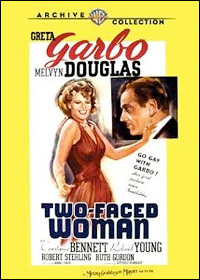 |
Here was a '30s-style screwball comedy, but 1941 was no time for screwball comedy; the deco Park Ave. trappings — which never did look all too realistic in the midst of the Depression — must have seemed jaw-droppingly inapt when the film was unspooled. What's more, Garbo gives what you might call a Carole Lombard performance and looks mighty uncomfortable in the process. Game, yes; but so uncomfortable that you can understand how the 35-year-old legend might have taken one look at "Two-Faced Woman," thought "I want to be alone," and instantly decided to return before the camera nevermore.
Which is not to say that the film, a new release in Warner's Archive Collection, is not worth a look. Garbo and Douglas, who did so very well in "Ninotchka," remain charming and talented but they can't budge this material. Of course, they don't have director Ernst Lubitsch and screenwriter Billy Wilder here; M-G-M gave them George Cukor and the screenwriting team of S.N. Behrman, Salka Viertel and George Oppenheimer (who I would guess didn't collaborate, exactly).
The story is about a sophisticated New York magazine editor (Melvyn) who — on a ski trip out West — falls (most literally) for a Swedish ski instructor (Greta). When his boss whisks him to New York, Garbo — masquerading as her wild twin sister — flies East to win him back. The humor of the thing, in theory, is in seeing Garbo with her hair down; they even put her in an evening gown she is literally falling out of. And she dances, too, a big Latin-influenced nightclub number staged by Bob Alton (just back from choreographing the Broadway premiere of Pal Joey). Along with the stars and that dance number, there is some ridiculous ski footage. Most interesting to me, anyway, is the chance to see Ruth Gordon at the beginning of her screen career. (She was 44 already, but even so.) Gordon had made two films the year before, but in period pieces; here is Gordon as she must have looked during her days as a top Broadway star. She plays Douglas' secretary, and holds her own against Garbo. And Garbo fans take note: Warner Archive has released two more of her films, "Romance" and "Torrent."
*
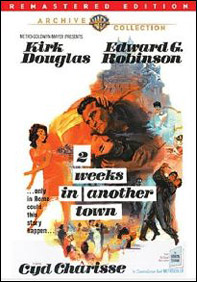 |
The film is about a formerly great Hollywood star, just out of the loony bin; a maniacal but washed up director, played by Edward G. Robinson; and an out-of-control ex-wife in the guise of Cyd Charisse, who gives a pretty strange performance. Hidden away in the wild Roman party scene at the end is an 18-year-old singer on the bandstand, playing the role of the Chanteuse. Look close: Leslie Uggams.
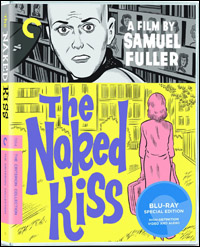 |
Also on hand is Patsy Kelly, of all people. If "The Naked Kiss" was seen as a throwaway exploitation film at the time, Mr. Fuller has achieved the reputation of a visionary who can be said to have set the path for the likes of Scorsese and Tarantino. So much so that Criterion has seen fit to give Blu-ray treatment to not only "The Naked Kiss" but Fuller's 1963 "Shock Corridor," which takes place in a mental asylum and also features Ms. Towers — who sits for interviews on both DVDs. And yes, she mentions Anya and her co-star in the tuner, Lillian Gish.
*
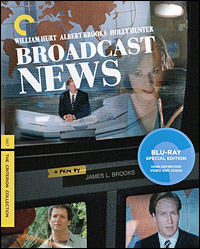 |
Brooks knows of what he writes; he started his career scripting television news at CBS in New York in the final days of Edward R. Murrow. Then on to sitcom land, where he was one of the creators of two newsroom sitcoms, "The Mary Tyler Moore Show" and "Lou Grant." As well as a few little items like "Taxi" and "The Simpsons." (He also created the wickedly funny "The Critic," which was too good for the average TV viewer.) His films include "Terms of Endearment," "As Good As It Gets," and "The Simpsons Movie." Which is to say, the fellow has a knack for incisive comedy with ideas contained within. The Criterion release was "supervised and approved" by Brooks, and looks fine on Blu-ray. Special features include commentary by Brooks and editor Richard Marks; a documentary on Brooks' career featuring Marilu Henner and Julie Kavner; an interview with Susan Zirinsky, a CBS news producer who was a model for the Hunter character — and an associate producer of the film; and a featurette containing on-set interviews with the three stars. Oh, and there are deleted scenes plus an improvised and not exactly finished alternate ending in which girl finally gets boy as they ride off into the sunset, or rather in a DC cab.
There is also a little bonus within the film itself. Midway through, two scraggly young songwriters break into the newsroom to audition a newscast theme. Should the short, bearded fellow with wild hair, green shirt and flowered tie look familiar, there's a reason; it's Marc Shaiman, 15 years before Hairspray.
*
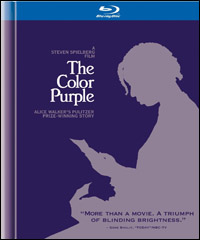 |
"The Color Purple," adapted from the Pulitzer Prize-winning novel by Alice Walker, embraced, enthused and enthralled viewers. It also introduced them to two of the more astounding and influential performers who — at the time — seemed unlikely candidates for overnight superstardom and instant celebrity. In a two-and-a-half hour film filled with fine performances, Whoopi Goldberg and Oprah Winfrey are equally riveting.
Warner has encased the Blu-ray in a photo-filled digibook. Bonus features include "Conversations with the Ancestors: The Color Purple from Book to Screen"; "A Collaboration of Spirits: Casting and Acting The Color Purple"; "Cultivating a Classic: The Making of The Color Purple"; and "The Color Purple: The Musical." The latter of which was, alas, ineffective in comparison with "The Color Purple" the Film.
(Steven Suskin is author of the recently released Updated and Expanded Fourth Edition of "Show Tunes" as well as "The Sound of Broadway Music: A Book of Orchestrators and Orchestrations," "Second Act Trouble" and the "Opening Night on Broadway" books. He can be reached at [email protected].)
*
Visit PlaybillStore.com to check out theatre-related DVDs for sale.


Evan-Zimmerman-for-MurphyMade.jpg)






